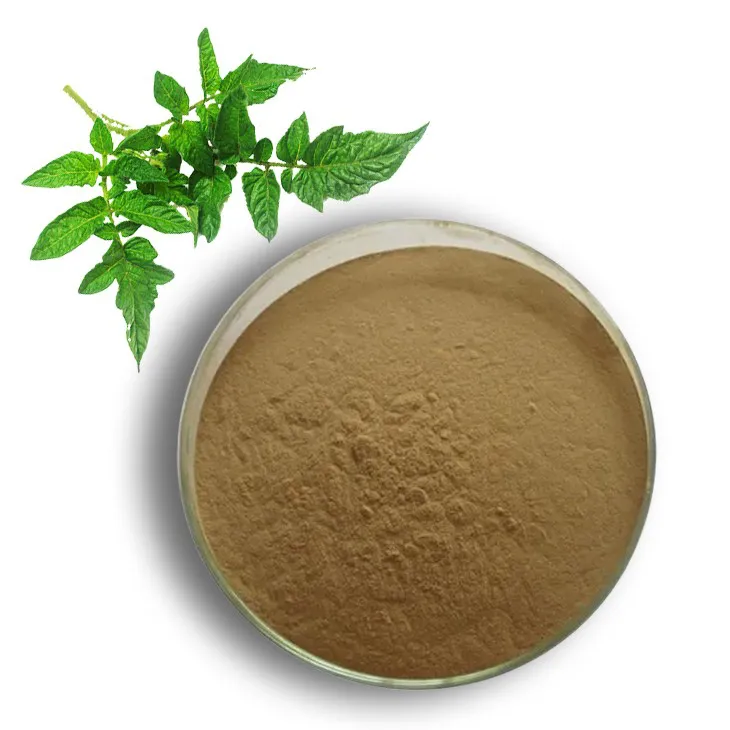- 0086-571-85302990
- sales@greenskybio.com
Senna Leaf Extract: Vitality, Strengthening and Balance
2024-12-20

1. Introduction
Senna Leaf Extract has been a subject of great interest in various fields. Its significance lies in the rich active components it contains, which endow it with multiple properties. This extract has a long - standing history in traditional medicine, and now it is also being explored in modern research for its potential health benefits. It is important to note that while senna has shown promise, its use should be carefully considered and regulated due to potential side effects.

2. Vigor and the Metabolic Impact
2.1. The Role in Metabolism Senna Leaf Extract can have a positive impact on the body's metabolic processes. Metabolism is a complex network of chemical reactions that occur within the body to maintain life. These reactions include the conversion of food into energy, the synthesis of new molecules, and the breakdown of waste products. Senna extract may influence this process by stimulating certain enzymes or pathways involved in metabolism. For example, it could potentially enhance the breakdown of fats or carbohydrates, providing more energy for the body's cells. This increased energy availability can lead to a feeling of vigor, where individuals may experience increased alertness, reduced fatigue, and improved overall physical performance.
2.2. Scientific Studies on Vigor Several scientific studies have been conducted to explore the relationship between Senna Leaf Extract and vigor. In one study, researchers observed that rats fed with a diet containing senna extract showed increased activity levels compared to the control group. The rats in the experimental group were more active in their cages, spending more time exploring and engaging in physical activities. Another study on human subjects found that those who consumed a supplement containing senna extract reported a reduction in mid - afternoon fatigue. However, it is important to note that these studies are still in the early stages, and more research is needed to fully understand the mechanisms behind this effect and to ensure its safety and efficacy in humans.

3. Strengthening Physiological Functions
3.1. General Physiological Strengthening Senna leaf extract may assist in improving certain physiological functions. One of the key areas it may impact is the immune system. A strong immune system is crucial for the body to defend against various pathogens, such as bacteria, viruses, and fungi. Senna extract contains components that could potentially boost the immune response. For example, it may enhance the production of white blood cells, which are the body's first line of defense against infections. Additionally, it may also have a positive effect on the cardiovascular system. By improving blood circulation and reducing inflammation in the blood vessels, it could contribute to the overall strength of the cardiovascular system.
3.2. Specific Organ and Tissue Support In terms of specific organs and tissues, senna leaf extract has shown potential benefits. For the liver, it may help in detoxification processes. The liver is responsible for filtering out toxins from the blood, and senna extract could potentially enhance this function. In the case of the digestive system, it can play a role in maintaining the health of the intestinal lining. A healthy intestinal lining is essential for proper nutrient absorption. Senna extract may also support muscle function. Muscles require a constant supply of energy and nutrients, and by improving overall metabolism and circulation, the extract can contribute to better muscle performance and strength.

4. Maintaining Body Balance
4.1. Digestive Function Regulation One of the important aspects of maintaining body balance is through the regulation of digestive function. Senna leaf extract has long been known for its effect on the digestive system. It acts as a laxative, helping to relieve constipation. Constipation can disrupt the normal functioning of the digestive tract, leading to discomfort, bloating, and other problems. By promoting regular bowel movements, senna extract helps to keep the digestive system in a healthy state. However, it is crucial to use it in moderation, as excessive use can lead to diarrhea and other digestive issues. In addition to its laxative effect, senna extract may also help in balancing the gut microbiota. The gut microbiota plays a vital role in digestion, nutrient absorption, and overall health. Senna extract could potentially influence the growth and composition of the gut microbiota, promoting a more balanced and healthy gut environment.
4.2. Hormonal and Fluid Balance Senna leaf extract may also play a role in maintaining hormonal and fluid balance within the body. Hormones are chemical messengers that regulate various physiological processes, such as growth, metabolism, and reproduction. Imbalances in hormones can lead to a wide range of health problems. While the exact mechanism is not fully understood, senna extract may interact with the endocrine system to help maintain hormonal balance. In terms of fluid balance, the body needs to maintain a proper ratio of water and electrolytes. Senna extract could potentially affect the body's fluid regulation mechanisms, although more research is needed to clarify this.
5. Traditional and Modern Research
5.1. Traditional Medicine Use In traditional medicine, senna has been used for centuries. In Ayurvedic medicine, which is an ancient Indian system of medicine, senna has been used to treat constipation and other digestive disorders. In traditional Chinese medicine, it has also been used for similar purposes. The traditional use of senna was based on empirical knowledge passed down through generations. However, it was often used in combination with other herbs to balance its effects and reduce potential side effects.
5.2. Modern Research Efforts Modern research on senna leaf extract is focused on several areas. Scientists are trying to isolate and identify the active components in senna that are responsible for its various effects. They are also conducting more in - depth studies on its safety and efficacy. For example, researchers are exploring the long - term effects of senna extract on the body, especially on the liver and kidneys, as these are the organs involved in metabolizing and excreting substances. In addition, modern research is looking into new applications of senna extract, such as its potential use in the development of new drugs for metabolic disorders or immune - related diseases.
6. Considerations and Precautions
6.1. Potential Side Effects While senna leaf extract has potential health benefits, it also has some potential side effects. As mentioned earlier, excessive use can lead to diarrhea, which can cause dehydration and electrolyte imbalances. In some cases, long - term or improper use may also cause damage to the colon or other parts of the digestive system. Additionally, some people may be allergic to senna, and allergic reactions can range from mild skin rashes to more severe respiratory problems.
6.2. Dosage and Usage Guidelines Given the potential side effects, it is important to follow proper dosage and usage guidelines. The appropriate dosage can vary depending on factors such as age, health status, and the purpose of use. In general, it is recommended to start with a low dose and gradually increase if necessary, under the guidance of a healthcare professional. It is also important to note that senna should not be used as a long - term solution for constipation, but rather as a short - term remedy. If digestive problems persist, it is advisable to seek medical advice.
7. Conclusion
Senna leaf extract has a rich history in traditional medicine and shows potential in modern research for contributing to vigor, strengthening physiological functions, and maintaining body balance. However, due to its potential side effects, it should be used with caution. More research is needed to fully understand its mechanisms of action, safety, and efficacy, especially in the long - term. With proper regulation and usage, senna leaf extract may offer a valuable addition to the field of natural health products.
FAQ:
What are the main active components in Senna leaf extract?
Senna leaf extract contains various active components. One of the main ones is sennosides. These sennosides are responsible for many of the extract's properties such as its effects on the digestive system. There are also other compounds like flavonoids and tannins which may contribute to its overall impact on the body.
How does Senna leaf extract contribute to the body's metabolic processes?
The sennosides in Senna leaf extract can stimulate the intestinal tract. This stimulation can lead to increased peristalsis, which in turn can affect the overall metabolism. By promoting better digestion and waste elimination, it can help the body better absorb nutrients and utilize energy, thus having a positive impact on metabolic processes.
What physiological functions can Senna leaf extract improve for strengthening the body?
Senna leaf extract may improve functions related to the digestive system. For example, it can help relieve constipation by promoting bowel movements. It may also have a role in maintaining the health of the intestinal lining. Additionally, it might influence the body's water - electrolyte balance which is important for overall physiological function and can be considered as a way of strengthening the body.
How does Senna leaf extract regulate digestive function to maintain body balance?
Senna leaf extract, mainly through its sennoside content, can act on the smooth muscles of the intestines. It can increase the frequency and intensity of contractions, which helps in moving food through the digestive tract more efficiently. This proper movement helps in maintaining a balance in the digestive process, preventing issues like constipation or improper absorption.
Is Senna leaf extract safe for long - term use?
While Senna leaf extract has potential health benefits, long - term use may have some risks. Over - use can lead to dependence on laxatives and may cause problems such as electrolyte imbalances. It is recommended to use it under the guidance of a healthcare professional, especially for long - term usage.
Related literature
- The Pharmacological and Medicinal Properties of Senna Leaf Extract"
- "Senna Leaf Extract: Traditional Use and Modern Research"
- "Beneficial Effects of Senna Leaf Extract on Digestive Health"
- ▶ Hesperidin
- ▶ Citrus Bioflavonoids
- ▶ Plant Extract
- ▶ lycopene
- ▶ Diosmin
- ▶ Grape seed extract
- ▶ Sea buckthorn Juice Powder
- ▶ Fruit Juice Powder
- ▶ Hops Extract
- ▶ Artichoke Extract
- ▶ Mushroom extract
- ▶ Astaxanthin
- ▶ Green Tea Extract
- ▶ Curcumin
- ▶ Horse Chestnut Extract
- ▶ Other Product
- ▶ Boswellia Serrata Extract
- ▶ Resveratrol
- ▶ Marigold Extract
- ▶ Grape Leaf Extract
- ▶ New Product
- ▶ Aminolevulinic acid
- ▶ Cranberry Extract
- ▶ Red Yeast Rice
- ▶ Red Wine Extract
-
Chasteberry Extract
2024-12-20
-
Citrus Aurantii Extract
2024-12-20
-
Diosmin
2024-12-20
-
Garcinia Cambogia Extract
2024-12-20
-
Yam Extract
2024-12-20
-
Kelp Extract Powder
2024-12-20
-
Senna Leaf Extract
2024-12-20
-
melatonin extract
2024-12-20
-
Dan Shen Root Extract/Salvia Root Extract
2024-12-20
-
Soy Extract
2024-12-20




















